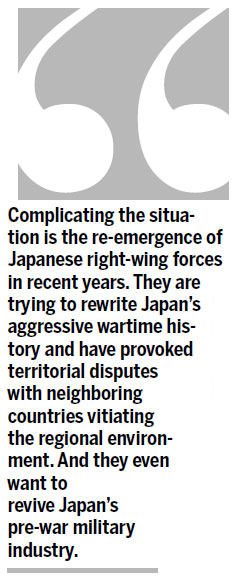Japan arms its way out of crisis
At previous G7 and G20 meetings, some countries had criticized Japan's quantitative easing approach but stopped short of blaming it for partly creating the current global economic problems because the US was implementing QE3 then. But now that the US is tapering out QE3, Abenomics will come under more attack.
The aggregate increase in Japan's stock market - 40 percent in the first four months of this year - has generated generous profits that can be injected back in due time to stabilize the yen and the stock market in order to narrow the gap with the US in terms of interest and inflation rates. As a result, Japan can prevent the yen from appreciating further by the time the US ends QE3 and thus ensure continued export growth.
At the same time, Japan expects to explore new ways of boosting economic growth, for instance, by focusing on the military industry.

Japan's economic growth depended a lot on its once booming foreign trade, when it launched major commodities to boost its exports. For example, from the 1950s to the 1970s, Japan's major exports were textiles, clothing, toys, iron and steel; in the 1980s and 1990s, they were automobiles, TV sets, radios, refrigerators and electronics. This turned a host of Japanese companies and brands, such as Toyota, Sony and Panasonic, into global players.
But as it entered the 21st century, Japan's economy started floundering in the face of competition from the European Union and South Korea. Consequently, many Japanese companies have suffered consecutive losses and accumulated huge debts. Sony has sold many of its office buildings at home and abroad. The Japanese media reports that some foreign companies have been in negotiations with Sanyo and Sharp for mergers and acquisitions.
Complicating the situation is the re-emergence of Japanese right-wing forces in recent years. They are trying to rewrite Japan's aggressive wartime history and have provoked territorial disputes with neighboring countries vitiating the regional environment. And they even want to revive Japan's pre-war military industry.
The right-wing forces believe that by increasing Japan's arms production they will not only boost the country's military capabilities to act as deterrence against neighboring countries, but also bolster exports to expedite economic growth. Recently, Japan has vowed to extend military support to countries that have high territorial ambitions by offering them official development aid or low-interest loans to help them purchase Japanese weapons. This shows that Japan conspires to provoke an armed conflict in the region to boost its arms exports.
The author is a researcher at the Chinese Academy of International Trade and Economic Cooperation, affiliated to the Ministry of Commerce.
(China Daily 07/15/2013 page9)



















